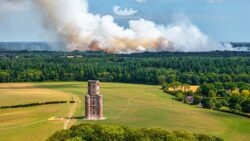Dorset’s heathlands — like Holt Heath and Newton Heath — are some of the rarest habitats in the UK, home to species you won’t find anywhere else. But in hot, dry weather, they are incredibly vulnerable to wildfire.
Recent Fires in Dorset
This summer’s blazes have been a stark reminder of how quickly fire can devastate our landscapes:
Holt Heath (near Wimborne) — A wildfire has decimated 69 hectares of heathland cared for by the National Trust. The majority of the flames are now out, but the work is far from over, and fire crews remain on site. Amid the blackened ground, there’s been a small ray of hope:
Purbeck ranger Emma, alongside Amphibian and Reptile Conservation, Birds of Poole Harbour, and Dorset Heaths Partnership, answered a call for volunteers to rescue surviving wildlife.
Almost 30 reptiles were saved, including a sand lizard (the UK’s rarest lizard), a grass snake, slow worms, and common lizards — found sheltering in tiny patches of unburnt vegetation where they were vulnerable to predators and starvation.
A heartfelt thank you goes to DW Fire & Rescue for their tireless efforts in battling the blaze.
Newton Heath (Middlebere) — Earlier in August, around 25 hectares (about 35 football pitches) were burned. More than 30 fire crews worked in tough conditions to contain the flames. Investigators believe this fire was deliberately started.
The Impact of Fire on Heathland

When heath burns, it’s not just the plants that are lost. Ground-nesting birds, reptiles, and countless insects perish. Survivors often face a barren, foodless landscape. Recovery is slow — heather and gorse may re-sprout, but it can take 15–25 years for the ecosystem to return to full health.
Main Causes of Heath Fires
The vast majority are human-caused:
Disposable BBQs or campfires
Cigarettes tossed onto dry ground
Glass bottles magnifying sunlight
Hot vehicle exhausts parked over vegetation
Arson
How You Can Help
Avoid open flames anywhere near heathland.
Take litter home — glass and metal can start fires.
Keep to paths and avoid driving over dry vegetation.
Report smoke or fire immediately by calling 999.
Support local conservation and fire prevention campaigns.
Final Thought
This summer’s fires show just how fragile Dorset’s heathlands are — and how much difference quick action and community effort can make. While the scars on Holt Heath will take decades to fade, the rescue of those 30 reptiles is a reminder that even in the worst of times, there’s hope when people come together to protect nature.